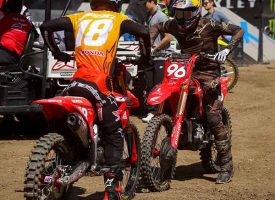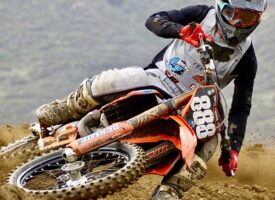Out of the Blue: Samantha Vaughan
By Jeff McConkey
Name: Samantha Vaughan
Birthday: June 16, 1993
Hometown: Toronto, Ontario
School & Grade or Occupation: Recent Kinesiology graduate from Queen’s University. Will be starting a post-grad diploma program at Durham College in the Fall.
Number: 113
Bike: 2014 SXF-250 and 2009 SXF-250
Race Club: MMRS and OCMC
Classes: Ladies A, Youth C, 250 C, Novice A

Let’s get to know one of your new favourite female racers, Samantha Vaughan, a little better. – Harvey Gold photo
How did you get started in racing?
When I was five, my dad taught me how to ride at the cottage on a Honda mini-trail from the 1970’s. As I grew, so did the collection of old Honda trail bikes and complaints of children riding around on the back cottage roads. A neighbour at the cottage used to race motocross and would tell us all stories about his races – which I found super-interesting. After years of telling my parents that I wanted to start racing, my dad finally agreed to take me to a track. We loaded up a 1978 SL75 and spent the day at Burnt River. Ever since then, I’ve been hooked.
As a little girl, did you ever expect to be this deep into a sport like motocross?
Never. Growing up I was incredibly fortunate when it came to extra-curricular opportunities that my parents provided for me. I played all kinds of sports, but most weeknights and weekends were spent at dance competitions, baseball games or tournaments, and practices for different school sports teams. I continued to be involved in five sports teams and dance all throughout high school, but none of them interested me as much as motocross did. I began racing at the age of 14, and until then I had only thought of riding as a fun cottage activity. But I found that racing was different. It was an escape, yet an adrenaline rush. It was unlike all other activities I was involved with, and honestly the track really felt like home.
Do you think motocross is harder for a female to compete in?
I think it is hard for anyone to compete in this sport. Motocross is full of challenges both on and off the track. The best way to get better at the sport is to be out there racing and practicing with other racers, but getting there is half the struggle. Ensuring that you are physically and mentally ready before every race is a challenge – regardless of gender or age.
Being a female in this sport only pushes you to be that much more focused. If the quicker racers that you want to race, and learn from, are in a male class, you have to be prepared to race or practice with that class.
Who is your favourite rider and why?
My favourite rider is definitely Ryan Dungey. Not only is he an amazing racer in both SX and outdoor, but he is also a great example of a professional athlete. He always supports how well other racers are doing and he is humble enough to admit when he isn’t racing his best. He works hard both on and off the bike, and shows other athletes and racers how much more there is to being an athlete than just pure talent.
Is there one lady racer out there that you think has paved the way for other girls to be successful in the sport?
I think Vicki Golden is paving the way for other female racers to become more involved and successful in the sport. She has proven over and over again that female racers can be just as fast and competitive as the guys who are racing at the same events.
What Canadian Pro do you look up to and why?
There are so many awesome Canadian racers to look up to, but one that stands out to me is Kyle Beaton. I suffered from a similar injury that he did, and it is encouraging to see how he was able to get back on the bike and remain involved with the sport after all he has been through. Although he is no longer racing, I think it is awesome that he is giving back to the sport by helping other racers become stronger, safer, and more skilled athletes.
What is your favourite track and why?
My favourite track is Cochrane’s in Colborne, Ontario. It was the first track, other than OCMC, that I won a Ladies A race. As well, I think it is a safe but challenging and fun track for racers of all skill levels. There are some parts of the track that I still struggle with, but it gives me something to work and improve on each time I am there.
What are your goals for this season?
My goals for this season are to race the East Nationals and all of the MMRS events that don’t conflict with these races. I have never raced any of the national events but it has always been something I have wanted to do. Another goal for this season is to move up to the Intermediate class at OCMC. The last few races I have been matching some of the Intermediate lap times and am stoked with my progress this season so far, but there is always lots to work on!
What is your biggest accomplishment?
By biggest accomplishment is getting back into racing after almost losing my right leg and being told I’d be lucky to walk again. Four years ago I cased a jump and shattered my right ankle. While recovering in the hospital from surgery, I got compartment syndrome in that leg and had severe nerve damage from my knee down – I was told the damage may never repair itself.
After spending three weeks in the hospital, and seven months in and out of casts, I was terrified that I wouldn’t be able to get myself back on the bike – but I did. I’ve had four surgeries so far, and I am likely going to need two more, but I’m just thrilled that I can be back on the bike. I walk with a bit of a limp and ride a little funny to compensate for a non-mobile ankle, but hey, that’s part of racing.
What is your favourite part about going to the races?
I’d have to say the feeling I get when I am sitting on the line right before the 30-second board is held up. The moment I swing my leg over the bike at the gate, I know nothing else matters for the next 10 – 20 minutes except for what lies ahead on the track. It’s an escape from real life and a time where you rely on no one but yourself, and all your hard work pays off.
What do you like to do when you aren’t racing?
When I am not racing, I enjoy lifting heavy things and placing them back in the exact same location – working out. Throughout my time at Queen’s, I was an intern in the Strength and Conditioning program working with our varsity athletes. This experience had a huge influence on my understanding of how important it is as an athlete, especially with motocross, to constantly be improving all aspects of your fitness.
On off-weekends from racing, I try to make it up to the cottage and spend time with friends and family. I find it helps me re-focus and gives my body some recovery time.
Is it important to have a motocross racer as a boyfriend/husband, or just a bonus?
I definitely think it is important to have a boyfriend/husband with a passion for something – regardless of if it is motocross or not – the same way that I have a passion for racing. I think it allows for a better understanding of why we do what we do for the sport,
whether that involves financial choices, social sacrifices, or even our health. If their passion is also motocross that would be a huge bonus and definitely make weekend plans a lot simpler. It would also allow for some fun, friendly competition.
If you ever have children, will they be motocross racers?
I loved being able to participate in all kinds of sports growing up and I think it is important for learning all kinds of life lessons and skills. If I have kids and they fall in love with motocross like I did they would have 100% support from me. If they end up liking another sport more, well, lets just see what happens when they get bit by the motobug…
Who do you want to thank?
I’d like to thank my parents and sister for their support with racing, especially my dad. When it is race day he is not just my dad, he is also my mechanic, transportation provider, coach, gate prepper, and is always able to tell me just what I need to hear before or after races.
I’d also like to thank CORE Motosports and 6D Helmets for all of their support this season, the whole MMRS team and OCMC volunteers who work hard to ensure us racers have successful and safe race days, and anyone else who has supported my racing in any way.






